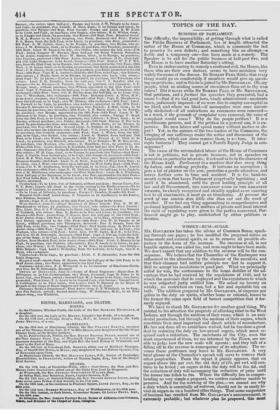TOPICS OF Tilt DAY.
BUSINESS OF PARLIAMENT;
THE difficulty, the impossibility, of getting through what is called the Public Business of Parliament, has at length attracted the notice of the House of Commons, which is commonly the last to perceive its own defects ; and something like an attempt—a feeble and a temporary one—has been made at a remedy. The Speaker is to call for the public business at half-past five, and the House is to have another Saturday's sitting. Even in endeavouring to remedy a confessed evil, the House, like those who are their own doctors, seems to have mistaken very widely the cause of the disease. Sir ROBERT PEEL thinks that every thing would go on comfortably if members would give up spe ak- ing on petitions ; and in this he is joined by Mr.BaouGHAM. Oh, my people, what an abiding source of uneasiness thou art to thy wise rulers ! Did it never strike Sir ROBERT PEEL or Mr. BROUGHAM, that petitions, and ()fortiori the speeches they generated, had a cause ?—that if we had good laws, wisely administered—moderate- taxes, judiciously imposed—if we were free to employ our capital as- we liked, and where we liked—if monopolies were once univer- sally abolished—if all restrictions on commerce were removed— in a word, if the grounds of complaint were removed, the voice of complaint would cease ? Why do the people petition ? It is a troublesome process, and if the petition be a general one, it is ex- pensive. Do men labour and spend money without motive or ob- ject? Yet, in the opinion of the two leaders of the Commons, the . bringing of our sufferings under the notice and discussion of the. Legislature, which can alone remove them, is a—bore. It inter- rupts business ! They cannot get a Fourth Equity Judge in con- sequence!
The cause of the accumulated labour of the House of Commons is not in petitions, not in private business, not in speeches on general or on particular interests ; it is found to be in the character of the House itself. Parliament is a machine that does every thing. by halves, and nothing perfectly. It bottoms no corruption ; it puts a bit of plaister on the sore, prescribes a gentle alterative, and leaves further cure to time and accident. It is the hand-to- mouth system that keeps Parliament perpetually legislating'; and until it be abandoned, until the great leading principle of all. law and all Government, THE GREATEST GOOD OF THE GREATEST NUMBER, be clearly recognized and steadily applied as..an unerring test to all enactments, it must go on blundering. At present the work of one session does little else than cut out the work of another. If we had any thing approaching to comprehensive and profound legislation, and if in matters of private and local interest the right of regulating were given to the parties concerned, Par- liament might go to play, undisturbed by either petitions or debates.


























 Previous page
Previous page